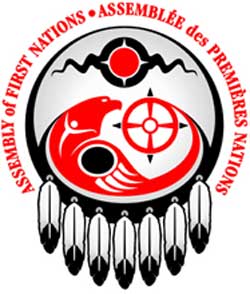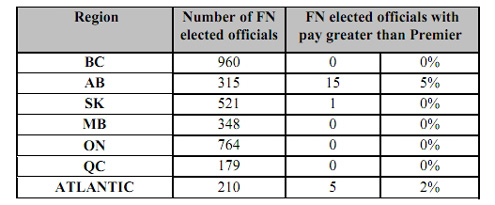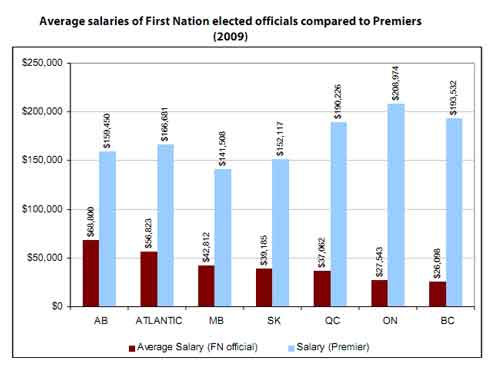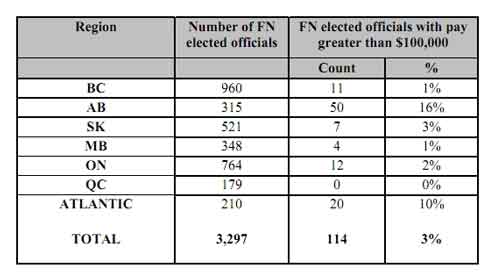 OTTAWA – Guest Editorial – On November 22, 2010, the Canadian Taxpayers Federation (CTF) published salary figures for First Nation Chiefs and Councillors from across Canada. This release by the CTF was timed to coincide with the introduction of MP Kelly Block’s Bill C-575 – the First Nations Financial Transparency Act – and alleged “new jaw-dropping reserve pay numbers” that, once again, misrepresent the First Nations reality. Since this time, numerous further stories have emerged on the CTF’s website and in the media to suggest “solutions.”
OTTAWA – Guest Editorial – On November 22, 2010, the Canadian Taxpayers Federation (CTF) published salary figures for First Nation Chiefs and Councillors from across Canada. This release by the CTF was timed to coincide with the introduction of MP Kelly Block’s Bill C-575 – the First Nations Financial Transparency Act – and alleged “new jaw-dropping reserve pay numbers” that, once again, misrepresent the First Nations reality. Since this time, numerous further stories have emerged on the CTF’s website and in the media to suggest “solutions.”
As the national organization representing First Nation citizens in Canada, the Assembly of First Nations (AFN) has always supported the principle of fiscal accountability – but not in the manner set out by the CTF.
By focusing on the exceptions, rather than the predominant reality, and by locating the solutions within the Indian Act, rather than in a process that would see First Nations assume control over their own affairs, the CTF’s approach is doing more to harm First Nations than it is to address the archaic federal structures that purport to “do what is best for the Indians.”
Obviously, where there are fiscal improprieties, these should be addressed. But a scattergun approach that relies upon stereotypes and then advances salary figures based on the CTF’s own fictitious calculations leaves little room for informed discussion or the advancement of meaningful solutions. The CTF’s alarmist focus sets aside years of advocacy carried out by the AFN on behalf of First Nations across Canada that calls for the implementation of better accountability mechanisms, but without the unnecessary and inaccurate implication that First Nation leaders are corrupt.
The germination of AFN’s efforts in this regard are captured in the 2004 publication of “Federal Government Funding to First Nations: the Facts, the Myths, and the Way Forward” which is available at www.afn.ca. This work, which focused on federal transfers to First Nations, was followed by the advancement of a broad strategy aimed at establishing a better basis for accountability, entitled “Accountability for Results.” It involved calling for:
- capacity building, aimed at an effective First Nations public service;
- institution building, aimed at providing First Nations with the facilities to govern; and,
- results-based management, based on five principles for accountability set out by the Auditor General of Canada.
This initiative, which was the subject of active policy engagement by the AFN for over two years, was ended by the federal government in 2007.
While First Nations are themselves aware of the challenges that exist within their communities regarding transparency and accountability, some would like to situate the blame squarely with First Nations themselves. Others, like the Auditor General of Canada, have pointed out that First Nation bands are already under a tremendous federal reporting burden – with an estimated 168 reports that are required from each and every First Nation annually.
Given this, a more meaningful context for a story about the salaries of First Nation elected officials is one grounded in reciprocal accountability and self-determination, rather than a smear campaign that sacrifices analysis for big headlines.
The real solutions to the misleading and divisive arguments being advanced by the CTF (and MP Kelly Block) must be found in moving beyond the archaic structures of the Indian Act, not further entrenching them within it.
THE CANADIAN TAXPAYERS FEDERATION’S ARGUMENT
The CTF issued its web publication aimed at the salaries of First Nation elected leaders in a manner that was intended to create alarm. Complete with misappropriated images of traditional First Nation figures, the CTF advances an argument that draws on a rampant stereotype that they themselves have helped to promulgate: the myth that First Nations are not accountable.
To enter into a debate about whether First Nations are or are not accountable – at this point – will do little to undo the sense of alarm that the CTF has helped to generate. Most Canadians have only a limited understanding of the situations, histories or aspirations of First Nations in Canada; sadly, it is the alarmist stories such as these that have the tendency to stick in peoples’ imaginations.
While any abuse or misspending is wrong, with 3,297 First Nation elected officials in Canada, it must be pointed out that this is absolutely not the norm as the CTF would suggest. The vast majority of First Nation elected officials are simply trying to earn a decent standard of living – just like most Canadians – and working very hard in the process. Rather than acknowledge this, the CTF issued its release relying upon the following opening statement:
“The numbers confirm what we’ve been saying all along…Many reserve politicians are paying themselves exorbitant salaries while keeping their band members and taxpayers in the dark”.
And what is an “exorbitant” salary? According to the Government of Canada, the average salary of working Canadians is $46,345.
Comparatively, First Nation elected officials earn an average salary of $36,845 – a discrepancy of almost $10,000.
Certainly, by focusing on the exceptions, the CTF is intentionally working to create a negative impression about First Nation salaries. Similarly, grand comparisons with the salaries of Premiers and the Prime Minister help to further distort the reality.
In examining the CTF’s figures, several significant questions emerge about assertions made by the CTF. Let’s look at some of the “facts.” For example:
Example 1: The CTF proclaimed that “approximately 50 reserve politicians paid more than prime minister in 2008-09.” Based on this claim, AFN gathered the most up to date information on Parliamentary salaries to confirm that the Prime Minister’s gross salary is $315,462.
However, the CTF included the calculation of “other” remuneration and “travel / per diems” in First Nation salaries. According to INAC’s Financial Reporting Guidelines, “other” remuneration relates to all other sources of revenue – not just actual salaries.
Did former Premier Danny Williams’ fortune get calculated into his salary as Premier?
Did revenue from Canada Steamship Lines get calculated into former Prime Minister Paul Martin’s salary? Of course not, and it’s not appropriate to do so with First Nation elected officials either. This is not methodologically correct – if we’re going to make comparisons, let’s compare apples with apples.
Similarly, “travel / per diems” relate to expenses that are incurred while on business that can be reimbursed. These are not included in the calculation of anyone else’s salaries; we are not sure why the CTF would include them here. Based on a more accurate analysis, the single highest annual salary of any First Nation elected official as found in the data provided by the CTF from INAC (inclusive of any honouraria) is $247,000.
The bottom line: AFN’s recalculation of the original figures provided to the CTF by INAC confirms that no First Nation elected official in Canada earns more than the Prime Minister.
Example 2: The CTF first claimed that “approximately 222 reserve politicians paid more than their respective premiers in 2008-09.” This figure was later revised by the CTF to 160.
However, according to our recalculation of the original figures provided to the CTF by INAC using actual salary dollars and honouraria, the AFN identifies that only 21 (rather than 160) First Nation elected officials earn more than their respective Premiers as follows:

This represents an extremely small fraction of First Nation elected officials in Canada (less than 1%; actually 0.6%) and does not meaningfully inform a debate about salaries in a First Nations context.
In fact, the average salary for a First Nation elected official in Canada is $36,845. The following chart shows the average salaries by region, compared to the salaries earned by their respective Premiers in each province. This chart shows the real differences between salaries of First Nation elected officials and that of the Premiers of Canada.

Example 3: The CTF claims that over 600 First Nation elected officials “received an income that is equivalent to over $100,000 off reserve.” The CTF uses the term “taxable equivalent” as a basis for inflating First Nation salaries to support the impression that First Nations earn exorbitant salaries.
The fact that, under the Indian Act, income earned by status Indians on First Nation reserves is tax free has its origins in the original relationship that First Nations had with the Crown and under Treaties. It is inaccurate – and unnecessarily alarmist – to calculate First Nation salaries in this way.
In the first place, not every First Nation elected official is a “status Indian” under the Indian Act and would, therefore, not qualify for a tax exemption. Secondly, the CTF’s strategy of roughly doubling everyone’s salary to give the impression that there is a huge expense based on salaries is simply unfair and misleading.
Given this, and contrary to the CTF suggestion that more than 600 First Nation elected officials earn over $100,000, the AFN has calculated that only 114 – or roughly 3% – fall into this category.
Based on this, you can imagine why many First Nation leaders are both concerned and upset by the CTF’s sweeping allegations. Despite these facts, the CTF has painted all First Nation elected officials with the same brush. The CTF is not contributing to a climate of free or informed disclosure of anything. Rather, as many of the comments on their blog demonstrate, this story only contributes to a long history of “Indian bashing.”

THE ASSEMBLY OF FIRST NATIONS POSITION: REAL SOLUTIONS FOR REAL PROBLEMS
First Nation governments are arguably among the most transparent and accountable governments in all of Canada. The AFN has long advanced its Accountability for Results initiative and continues to work with First Nation organizations and leaders – and with the Auditor General of Canada, the Treasury Board Secretariat, and Indian and Northern Affairs Canada – on better approaches to both governance and accountability.
We all know what the problems are – they are not exorbitant salaries – they are decades of paternalism that have placed many First Nation leaders in a position where they are responsible for implementing decisions, but where the ultimate power to make decisions rests with the federal government (i.e., under the Indian Act). Not only does this continue to be patently inappropriate, it remains a recipe for poor outcomes.
In July 2010, at AFN’s Annual General Assembly in Winnipeg, National Chief Shawn Ain-chut Atleo issued a challenge that would see First Nations move beyond the Indian Act over the next two-to-five years. This challenge speaks to the problems that many First Nations find themselves in in responding to allegations like those made by the CTF. The poverty that characterizes many First Nations remains the object of mainstream pity and regret, but with very limited understanding. And when a First Nation citizen community is seen to be too successful then, again, do they fall prey to intense scrutiny or contempt. Neither of these situations is acceptable, nor do they point us in the direction that so many First Nations want to go.
The solutions lie in returning to First Nations the powers that all nations require to be self-determining. The CTF is intent on smearing all First Nation leaders based on the alleged actions of a few. And in doing so, they are calling on Parliamentarians and Canadians to support MP Kelly Block’s private member bill, C-575.
If the issue were one only of transparency then, perhaps, the bill would be fine. But, as we have described, the issue is not so simple. Bill C-575 favours the further transfer of accountability away from First Nations, thereby only further entrenching the Indian Act and strengthening the Department of Indian Affairs’ role in this regard. This is not a solution, it is a short-sighted reaction to alarmist headlines – in fact, it takes us backwards.
The AFN needs the support of all Canadians to ensure that the Government of Canada works with First Nation governments in moving forward to create fundamentally new fiscal transfer arrangements and accountability measures. We are well beyond tinkering – what is required is transformative change. We all must do better.
